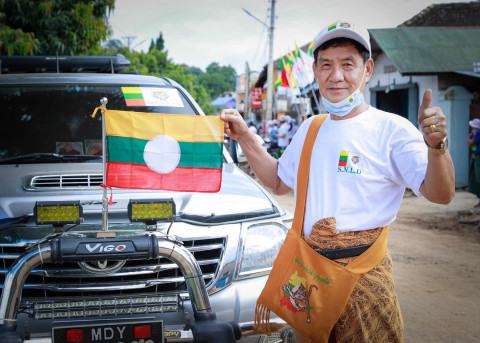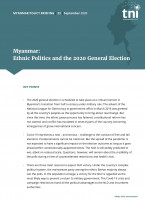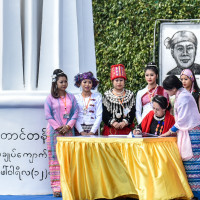What Elections Really Mean For Us: the 2020 Polls in Myanmar A Commentary by Lahpai Seng Raw
Regiones
With another general election imminent, concerns are deepening that ethnic nationality peoples will be marginalised once again. In this commentary, Lahpai Seng Raw explains why political systems and electoral practices deny equality and representation to so many of the country’s population. Elections will not change this. Political reforms are essential to achieve peace and national reconciliation.

Kham Kyin
As we all know, the Myanmar (Bamar) are the majority population, numerically speaking, in relation to the other nationality peoples who co-founded the Union of Myanmar (Burma). Today the non-Bamar peoples are represented by seven ethnic states: Chin, Kachin, Kayah (Karenni), Kayin (Karen), Mon, Rakhine (Arakan) and Shan. All these co-founders voluntarily took part in forming the new Union in 1948 to accelerate the process of independence from Great Britain. The principles of equality and autonomy were enshrined in the Panglong Agreement of February 1947. It was a time of uncertainty but also great hope for the future of our country.
Regrettably, this equal partnership – which was intended as the bedrock of the Union – has never been put in political place. The promises of the Panglong Agreement were quickly forgotten. Negotiations to end the political deadlock have failed in every generation of government, and armed conflicts have continued until the present day without reaching to any peaceful conclusion. Most recently, political hopes have been invested in the 2015 Nationwide Ceasefire Agreement and 21st Century Panglong Conference that began the following year. Both, however, have failed to achieve political leverage and accelerate the processes of change.
General elections are now scheduled for next month. But, with the peace process faltering, the question remains whether equality can be obtained through elections under the present political system or whether the results will further entrench the inequalities and marginalisation that have been at the heart of state failure since 1948. The need for peace and national reconciliation is urgent. Covid-19 is spreading, conflict and civilian displacement are still continuing, and these are days of real hardship and difficulties for communities across the country.
The biggest challenge is the election system itself. A system of quasi-civilian democracy was set up under the 2008 constitution. This includes parliaments at both the national and state/region levels. But the “first-past-the-post” voting system favours large better-financed parties in the different legislatures. Cementing their dominance, the large “national” parties, such as the National League for Democracy (NLD) and Union Solidarity and Development Party (USDP), put up as many candidates as possible, campaign in all the ethnic states, and run against local nationality parties. By comparison, parties representing ethnic peoples or territories are under-financed and unable to put up a great number of candidates.
Adding to the inequalities, the 2008 constitution is a civilian-military hybrid that prevents democratic rights being allowed to local peoples. Under these unique arrangements, the Tatmadaw (national armed forces) – which is also dominated by the majority Myanmar (Bamar) population – is reserved a quarter of all seats in the legislatures and control of three ministries (Defence, Home and Border Affairs). The consequence is to diminish the chances of local peoples – even if a majority population in their territories – from having an adequate number of representatives to speak on behalf of their interests.
The evidence is stark. Ethnic minority peoples constitute an estimated third of the country’s 54 million population. But only 19 of the 224 MPs in the current Upper House (Amyotha Hluttaw: House of Nationalities) are members of nationality parties, while the figure is just 37 out of 440 MPs in the Lower House (Pyithu Hluttaw: House of Representatives). Equally serious, this “first-past-the-post” system fuels the “winner takes all” mentality that echoes the cycles of conflict and marginalisation experienced by non-Bamar peoples in every political era since independence. The solution has long been clear: a proportional representation system that encourages discussion, understanding, compromise and appropriate solutions.
This lack of inclusion – and unwillingness to compromise – has been apparent in each and every winning party, past and present, during the past seven decades. No majority “national” party has ever considered meeting the ethnic nationality parties halfway. Today this is acted out in the state and region assemblies that were set up under the 2008 constitution as a token of devolved governance. The elected representatives in these bodies are not even allowed to select their Chief Minister. Instead, the national parties in Nay Pyi Taw cherry-pick this post for one of their own members even if an ethnic nationality party has won the largest number of seats. For local peoples, it is another example of the hegemony that has undermined the promises of equality and union made at Panglong.
For the present, there seems little or no chance that the majority national parties will vacate parliamentary seats in ethnic nationality areas or change their system of appointments to include nationality parties. A “top-down” culture permeates many parties and organisations in national politics. The same lack of inclusion exists in the failure to provide meaningful quotas for women candidates in MP selection. On the candidate list for the 2020 elections, only 16 per cent are females. Kachin State is even worse at just 12 per cent. It is a long way from reflecting the truism that women “hold up half the sky”.
To address these failings, there are – as with proportional representation – alternative measures that can be taken. Most obviously, a coalition government between the majority national party and ethnic nationality parties would mark an important step forward in national reconciliation. There were, for example, alliances between the NLD and such ethnic parties as the Shan Nationalities League for Democracy and Arakan League for Democracy during the long years under military rule. Since political transition began in 2011, however, the attitude of the majority parties seems to be to wait for the election results first and then see if they need a coalition – and, if so, with whom. This means that, unless ethnic parties win an absolute majority, they will never have the political power to decide or form administrations, even in their own states.
Sadly, as the November election approaches, there is little evidence that any of these deficiencies in political representation will be addressed. Rather, there are a number of other factors in the election landscape that are to the benefit of national parties who use them to their advantage when competing against nationality parties. Three in particular stand out: the delineation of constituencies; population displacement and migration; and the role of the Tatmadaw.
The first of these, the constituency system, is configured in such a way that the government will always be controlled by the majority population in central Myanmar where political power is concentrated. Backing this dominance up, the constituencies are township-based and have wide variations in the number of voters. This plays very much to the advantage of politically powerful candidates, especially from the main national parties, who will almost surely win in ethnically diverse areas. Their prospects are boosted by four main factors: the “first-past-the-post” system, “vote-splitting” among local parties, small constituencies, and the large numbers of candidates. Such questions over voting are a challenge in all political systems. But in Myanmar they have become a major concern for electoral democracy.
The second cause of ethnic under-representation are the continuing conflicts, civilian displacement and migration that are having significant impact on demographics in many parts of the country. It is already known, for example, that there are constituencies in Kachin, Karen, Rakhine and Shan States where there will be partial or total cancellations in the upcoming elections for security reasons. Meanwhile there are up to two million displaced persons and refugees in the borderlands with Bangladesh, China, India and Thailand. All are ethnic minority peoples. There are also an estimated four million migrants in neighbouring countries, a majority of whom are also non-Bamar peoples. But, in neither case, will they have the opportunity to cast ballots – at most, just over 100,000 votes in total.
Their exclusion, however, will not be the only influence on the election outcome. As conflicts continue, there are significant population movements underway. While many local peoples are displaced from their lands, migrants have come into these territories from other parts of the country – and they will be allowed to vote. This is a practice that the government appears to be encouraging. Previously, the requirement was for migrants to have stayed in their current place of work for a minimum of 180 days or 6 months to have this right. But under the present government this regulation has been changed to just 90 days or 3 months.
Unsurprisingly, many local peoples are deeply concerned by these displacement and migration trends. How can what they know as “short-stayers” have a true idea of the local situation, the local peoples, their cultures and the needs of local communities – let alone the political parties and candidates? This crisis is especially acute in ethnic states that are in conflict. Hundreds of thousands of migrants have moved into such territories as Kachin State where they work in the jade mines, banana plantations and other industries that are linked to business groups in China. Some are also entering into politics. But at this critical time in national transition the question has to be asked: who should be representing the interests of the local peoples in parliament?
This leads to the third concern over ethnic under-representation: the role of the Tatmadaw. Military representatives are already reserved 25 per cent of seats in the legislatures, but their influence is bolstered in a number of other ways in ethnic nationality areas. Two, in particular, stand out: the “resettlement” of veterans and the establishment of militia groups.
In the case of veterans, the resettlement policy was first conceived of in the 1950s. But it began in a more organised way in the 1990s during the era of the Union Solidarity and Development Association (the precursor to the USDP), when the programme was handled by the military’s Directorate of Rehabilitation and Resettlement. Indeed a large map has been displayed at the Defence Services Museum, showing where housing has been built for retirees, veterans or injured soldiers. All are in or around the edges of ethnic minority lands. Most recently, areas as remote as Sumprabum in Kachin State have been settled by veterans.
The incomers, however, are rarely local. Most have been recruited in different parts of the country. When they retire, they settle wherever their last posts have been. But who, local peoples ask, are they voting for? For there is very little chance that they will support local nationality parties in their resettlement areas. Equally important, many of these retirees become village or ward administrators, furthering strengthening military ties on the ground and making local citizens feel powerless. All the village heads are men.
This links to the second way in which the Tatmadaw has attempted to build up political influence in nationality areas: through the establishment of local “Pyithusit” (militia) and Border Guard Forces that are under the command of the Defence Services. Like Tatmadaw soldiers, families and veterans, most supported the USDP in the last two general elections, with some militia leaders standing as candidates. In this way, the Tatmadaw has considerably more power in ethnic nationality areas than the 25 per cent of seats in the legislatures or electoral backing of the USDP.
Such formations can also tip the political balance. In the 2015 election, it was not the SNLD or NLD that won most seats in Shan State but the USDP which had the support of local forces such as the Kutkai, Kaung Kha, Manpang, Pansay and Tar Moe Nye militia. On the surface, they are led by ethnic representatives. But they look more to their commanders than their peoples, and they are the representatives of parties that are not accountable to their constituents. As such, state-building is being founded on what Alex De Waal describes as “patrimonial politics” rather than democratisation and “institutionalised bargaining processes”.* This is the reality that ethnic nationality peoples have to face across the country today.
The challenge thus remains whether the inequalities in political representation can be addressed under the present election system. Conflict, displacement and the emergent threat of Covid-19 are all having a negative effect on campaigning, indicating that it will be difficult for ethnic nationality parties to have significant impact under current conditions. As campaigning moves online, it is the large national parties that have all the electoral advantages. Nevertheless it is vital that this moment for reflection and re-evaluation is not lost. Responsibilities to achieve peace and reconciliation in our country lie on all sides of the political and community spectrum.
First, the need for political reform is paramount. If Myanmar is ever to exit as a Union from the grievous cycles of ethnic conflict, all the country’s peoples must be able to represent themselves, their concerns and their needs in social, political, cultural and economic affairs. This means that the constitution and political system have to change. But this can only be achieved when there is equality and union that reaches to every part of the country. Unless this happens, change will only be made by the Myanmar (Bamar) majority population and will not address the vital issues for other nationality groups. The key requirement is representation by all ethnic groups in government, the legislatures, national institutions and national politics. Without this, we can do nothing much.
Second, we Kachins and other nationality peoples need to be more politically astute in facing the challenges ahead. The last general election, when minority groups were so marginalised, was a learning experience for all of us. Name recognition and populism played a big part among the general public. The campaign call among the main national parties is very effective: “no need to know the candidates but vote for the party”. This time, with Covid-19 and campaign restrictions, the large national parties could dominate again through the many privileges that they enjoy.
Ultimately, these are lessons that many nationality movements have already taken on board. There is more to democracy than holding elections and we do not assume that simply having formal democratic institutions in place will be enough. The need for reform is far-reaching, and the momentum for change is supported by increasing sectors of society, including political parties, civil society organisations, intellectuals, youth associations and women’s groups. Change must be built from communities on the ground.
And it is here that opinion remains strong that the current election system is failing us. The playing field is not level as we seek representation as a means to achieve equality and peace. We cannot be standing in the middle when there is an ocean of inequality. We need to take the side of the oppressed in the endeavour for social justice. We need to keep reminding ourselves – to borrow Haruki Murakami’s words – that “The System did not make us: we made The System”. It is to be hoped that the 2020 elections will mark the moment when the inadequacies of the present political system are understood, and peace and reform momentum are truly renewed.
Lahpai Seng Raw is a 2013 Ramon Magsaysay Award winner and co-founder of the Metta Development Foundation and Airavati. She was also a delegate at the 21st Century Panglong Conferences in 2016, 2017 and 2018.
*As quoted in Patrick Meehan, “Drugs, insurgency and state-building in Burma: Why the drugs trade is central to Burma's changing political order”, Journal of Southeast Asian Studies, Vol. 42.3, October 2011, p.379.


